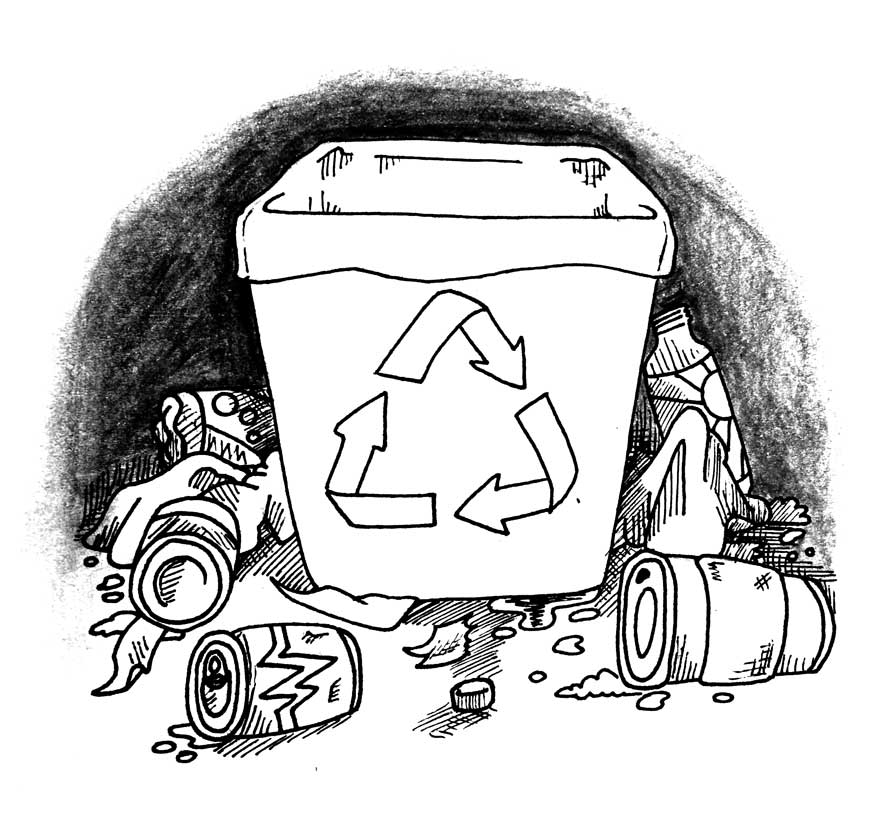
Environmental troubles can’t be solved with buzzwords
The University of Calgary Students’ Union loves buzzwords. Leadership, diversity, student engagement — you name it and an SU rep has probably used it on an election poster. But a particular buzzword has been used more frequently in the last few years as environmental issues became more pressing. This word is sustainability.
The SU has a few different ways of promoting sustainability, including compost programs in MacHall, a sustainability fund for student projects and a fair number of behind-the-scenes energy-saving techniques. For example, the slushee machines in Stör are turned off at night to save water and electricity.
Like all buzzwords, there’s something hollow about the kind of sustainability touted by the SU, no matter how well-intentioned it may be. While there’s nothing wrong with trying to use fewer disposable cups or turning the lights off when you leave the room, small changes can’t be where environmentalism ends.
Even if everyone on the planet decided to make their own lives more sustainable, the problems caused by environmental destruction and greenhouse gas emissions wouldn’t go away. This is because individuals aren’t causing these problems, at least not directly. Lasting change must instead come from the world’s governments, corporations and institutions, which are responsible for the overwhelming majority of the problems our planet faces, and are the only ones that can start to fix them.
Despite being the target of most sustainability initiatives, residential and commercial sectors are only responsible for about 10 per cent of greenhouse gas emissions and water use, as estimated by the Emission Database for Global Atmospheric Research.
On the other hand, the same study shows that agricultural and industrial processes account for over 60 per cent of all greenhouse gas emissions and over 80 per cent of all water use. These sectors also produce the largest amount of waste and take up massive amounts of land. If humans want to become more sustainable, we need to change how we grow our food and make our stuff.
Our society likely needs to be rebuilt from the ground up, and things won’t change unless institutional changes happen alongside individual change.
I’m not saying that it’s the responsibility of the SU to make sweeping societal changes. In fact, our student representatives have done a lot in the service of environmentalism while staying apolitical.
But it’s too easy to think that we’ve done enough for the earth by composting our clamshell containers and buying fair trade coffee when we’re no closer to fixing the mess our species has caused. The real danger is that sustainability initiatives can make us more complacent by convincing us that we’ve done our part.
While the SU is genuine in its efforts to promote sustainability, other organizations are not so innocent. Many institutions intentionally use the false sense of accomplishment conjured up by eco-friendly buzzwords to appear more environmentally conscious than they actually are. This is called greenwashing, and there are few better places to find examples of this than the U of C.
The U of C constantly throws around the word “sustainability.” They have programs like the Sustainability Street Team, the Sustainability Resource Centre and the SustainabilityON Awards. Newer buildings on campus like the Taylor Family Digital Library and the Energy Environment Experiential Learning building are also green buildings — figuratively and literally in the case of the EEEL. It appears that the U of C is doing everything it can in order to be as environmentally friendly as possible. But a closer look tells a different story.
Lecture halls named after Chinese state-owned oil companies and regular donations from energy giants are unambiguous indicators of where the U of C’s allegiances lie. Despite their insistence to the contrary, the university is still invested in the status quo and has no intention of changing that any time soon.
If the U of C was interested in sustainability, they would cut ties with the oil industry and focus their efforts on supporting the development of clean energy. But they won’t do this on their own.
The U of C is an institution that has the potential to affect massive change on a scale that a smaller organization like the SU can’t begin to approach. Instead, they seem content to promote shallow notions of sustainability. While we as individuals can’t accomplish much by recycling all of our plastics, we can at least refuse to buy into the idea that there isn’t more we can do.
Be critical of the organizations that tout their sustainability while still supporting harmful practices. Demand measurable change instead of the superficial. Because while all of this talk of waste-reduction and energy-saving may be nice, we can’t be satisfied with the green paint. There’s more to be done.
Sean Willett, Gauntlet Editorial Board
